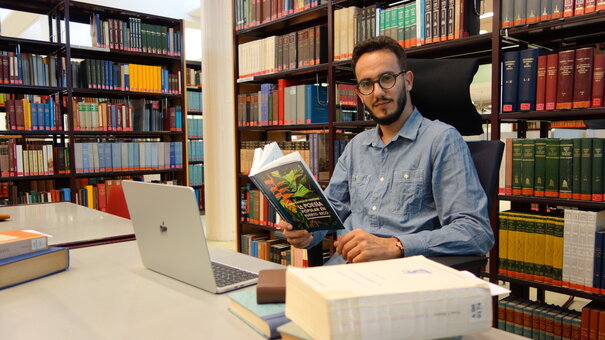Call for applications for the year 2026
For 2026, only applications dealing with one of the following topics will be accepted: “Knowledge production and knowledge circulation” and “Cultural production and cultural transfer.” The application deadline is Sunday, August 31, 2025. Applicants will be notified of the results of the selection process by email by the end of November.
Knowledge production and circulation / Cultural production and transfer
The interdisciplinary subject area "Knowledge Production and Knowledge Circulation" does not focus on a clearly defined object of investigation, but rather condenses different theoretical and methodological perspectives. These range from the history of science and the sociology of knowledge to more recent, post-colonial approaches. With regard to Latin America and the Caribbean, research focuses on the role that various forms of knowledge played in the configuration of pre-colonial societies, colonial relations and the development of independent nation states in the region, as well as their transregional interdependencies. Central questions in the context of this subject area are:
- How do different types of actors or groups of actors locate themselves in processes of knowledge production and knowledge circulation and how are they located by others? What strategies have they developed in the face of persistent multidimensional inequalities in processes of knowledge production and circulation? What role do these strategies play in the transformation of knowledge practices? How can the plurality of forms of knowledge and knowledge practices that characterize Latin America and the Caribbean be more adequately taken into account?
- What challenges and barriers do non-Western, indigenous and African-American ontologies and knowledge practices face? How can we contribute to their visualization and reception in the context of the scientific mainstream?
- How does knowledge produced in Latin America and the Caribbean circulate outside the region and what are the similarities and differences in terms of circulation, reception, translation and valorization processes? What contribution does Open Science make to the recognition of diversity, the dismantling of barriers and the dialog between different knowledge systems and knowledge practices?
- What effects do the digital transformation and the development of artificial intelligence have on the production, circulation and appropriation of knowledge, on the development of scientific disciplines, on scientific practices and on scientific innovation processes in Latin America and the Caribbean? What opportunities and challenges arise in this context?
For analyses in the field of "cultural production and cultural transfer", the consideration of interdependent inequalities and differences as well as media and intermedia elements and their historical and current transformations plays an important role. Such studies draw on a wide variety of theoretical perspectives. Cultural studies based in the humanities and social sciences use concepts such as transculturation, mestizaje, hybridity and creolization to explore the specific forms of Latin American and Caribbean cultural production. The analysis of the peripheral and postcolonial localization of this cultural production demonstrates the long-standing South-North asymmetries, but also the diverse transregional interdependencies and interactions. Phenomena of exclusion through racialization, class structures and/or gender inequalities configure a cultural production of complex representations that exhibit both similarities and differences to European patterns and genres. Cultural transfers as the results of processes of reception, transformation, appropriation and translation are considered in the context of the diverse hierarchies between different social groups. Central questions in the context of this subject area are:
- What processes of cultural production, reception, exchange and transformation have taken place and continue to take place within Latin America and the Caribbean and between Europe and Latin America and the Caribbean, and what role do formal and informal contexts, infrastructures and networks play in this? What significance does Latin American and Caribbean cultural production have for Germany and Europe?
- How are the various medialities/intermedialities and forms of representation shaped by technological, cultural, political and social change in Latin America and the Caribbean?
- How do different actors contest and negotiate the historical, political and aesthetic interpretations of representations and identities?
Requirements
The minimum requirement for an application is a first university degree and the beginning of a doctorate at the time of application.
The amount of the scholarhip is 1,300 € per month for doctoral candidates, 1,600 € for those with a PhD, and 800 € for people who do not need a full scholarship due to their other income, as well as up to 1.000 € for travel expenses.
Application
An online form is available for applications. The following documents must be uploaded during the application process (only PDFs are accepted, no other file formats):
- the completed application form for an IAI scholarship for 2026;
- a curriculum vitae including a list of publications;
- proof of the highest academic degree;
- Doctoral students only: Proof of the ongoing doctoral procedure;
- Doctoral students only: Two letters of recommendation. If possible, the letters of recommendation should refer to the submitted project. The letters of recommendation can be uploaded during the application process. It is also possible for the reviewers to send them directly to the IAI by e-mail (becas@iai.spk-berlin.de). Doctoral researchers do not have to submit letters of recommendation.
- A representation of the project according to the following structure (the character limits apply including spaces):
- Define the topic and the key questions of the study; also consider the following questions: How does the project relate to the topic of the call for proposals? What is innovative about the project? How does it relate to other disciplines? (max. 6,000 characters);
- Theoretical-conceptual approach and methodological approach (max. 6,000 characters);
- Current status of the project (max. 3,000 characters);
- Description/naming of the most important materials to be consulted during the research stay at the IAI (max. 3,000 characters)
- Bibliography (maximum 20 titles, please highlight the 5 most important titles for the project).
Applications and documents can be submitted in German, English, Portuguese and Spanish. Due to the high number of applications, it is unfortunately not always possible for the IAI to answer individual inquiries from applicants immediately. If you have any questions, please consult our list of frequently asked questions (FAQs) first.
Start of online application
Please ensure that you have all the necessary documents ready before you start the online application. The application process cannot be interrupted or saved.
Form
Contact
Dr. Clara Ruvituso
- Working area: Coordination guest researchers
- E-Mail: becas(at)iai.spk-berlin.de (opens your email program)
- Tel: +49 30 266 45 1310 (starts a telephone call, if your device allows this)

